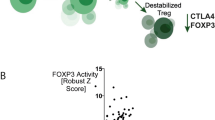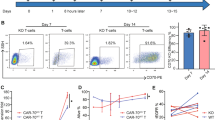Abstract
The functional fitness of CAR T cells plays a crucial role in determining their clinical efficacy. Several strategies are being explored to increase cellular fitness, but screening these approaches in vivo is expensive and time-consuming, limiting the number of strategies that can be tested at one time. The presence of polyfunctional CAR T cells has emerged as a critical parameter correlating with clinical responses. However, even sophisticated multiplexed secretomic assays often fail to detect differences in cytokine release due to the functional heterogeneity of CAR T cell products. Here, we describe a highly multiplexed single-cell secretomic assay based on the IsoLight platform to rapidly evaluate the impact of new pharmacologic or gene-engineering approaches aiming at improving CAR T cell function. As a key study, we focus on CD19-specific CAR CD8+ T cells modulated by miR-155 overexpression, but the protocol can be applied to characterize other functional immune cell modulation strategies.
Access this chapter
Tax calculation will be finalised at checkout
Purchases are for personal use only
Similar content being viewed by others
References
Finck AV, Blanchard T, Roselle CP et al (2022) Engineered cellular immunotherapies in cancer and beyond. Nat Med 28(4):678–689. https://doi.org/10.1038/s41591-022-01765-8
Rosenberg SA, Restifo NP (2015) Adoptive cell transfer as personalized immunotherapy for human cancer. Science 348(6230):62–68. https://doi.org/10.1126/science.aaa4967
Locke FL, Miklos DB, Jacobson CA et al (2021) Axicabtagene Ciloleucel as second-line therapy for large B-cell lymphoma. N Engl J Med 386(7):640–654. https://doi.org/10.1056/NEJMoa2116133
Maude SL, Laetsch TW, Buechner J et al (2018) Tisagenlecleucel in children and young adults with B-cell lymphoblastic leukemia. N Engl J Med 378(5):439–448. https://doi.org/10.1056/NEJMoa1709866
Majzner RG, Mackall CL (2018) Tumor antigen escape from CAR T-cell therapy. Cancer Discov 8(10):1219–1226. https://doi.org/10.1158/2159-8290.Cd-18-0442
Fuca G, Reppel L, Landoni E et al (2020) Enhancing chimeric antigen receptor T-cell efficacy in solid tumors. Clin Cancer Res 26(11):2444–2451. https://doi.org/10.1158/1078-0432.CCR-19-1835
Scharping NE, Menk AV, Moreci RS et al (2016) The tumor microenvironment represses T cell mitochondrial biogenesis to drive Intratumoral T cell metabolic insufficiency and dysfunction. Immunity 45(2):374–388. https://doi.org/10.1016/j.immuni.2016.07.009
Anderson KG, Stromnes IM, Greenberg PD (2017) Obstacles posed by the tumor microenvironment to T cell activity: a case for synergistic therapies. Cancer Cell 31(3):311–325. https://doi.org/10.1016/j.ccell.2017.02.008
Gattinoni L, Klebanoff CA, Restifo NP (2012) Paths to stemness: building the ultimate antitumour T cell. Nat Rev Cancer 12(10):671–684. https://doi.org/10.1038/nrc3322
Gattinoni L, Speiser DE, Lichterfeld M et al (2017) T memory stem cells in health and disease. Nat Med 23(1):18–27. https://doi.org/10.1038/nm.4241
Gattinoni L, Zhong XS, Palmer DC et al (2009) Wnt signaling arrests effector T cell differentiation and generates CD8+ memory stem cells. Nat Med 15(7):808–813. https://doi.org/10.1038/nm.1982
Sabatino M, Hu J, Sommariva M et al (2016) Generation of clinical-grade CD19-specific CAR-modified CD8+ memory stem cells for the treatment of human B-cell malignancies. Blood 128(4):519–528. https://doi.org/10.1182/blood-2015-11-683847
Arcangeli S, Bove C, Mezzanotte C et al (2022) CAR T cell manufacturing from naive/stem memory T lymphocytes enhances antitumor responses while curtailing cytokine release syndrome. J Clin Invest 132(12). https://doi.org/10.1172/JCI150807
Gattinoni L, Lugli E, Ji Y et al (2011) A human memory T cell subset with stem cell-like properties. Nat Med 17(10):1290–1297. https://doi.org/10.1038/nm.2446
Fraietta JA, Lacey SF, Orlando EJ et al (2018) Determinants of response and resistance to CD19 chimeric antigen receptor (CAR) T cell therapy of chronic lymphocytic leukemia. Nat Med 24(5):563–571. https://doi.org/10.1038/s41591-018-0010-1
Deng Q, Han G, Puebla-Osorio N et al (2020) Characteristics of anti-CD19 CAR T cell infusion products associated with efficacy and toxicity in patients with large B cell lymphomas. Nat Med 26(12):1878–1887. https://doi.org/10.1038/s41591-020-1061-7
Bai Z, Woodhouse S, Zhao Z et al (2022) Single-cell antigen-specific landscape of CAR T infusion product identifies determinants of CD19-positive relapse in patients with ALL. Sci Adv 8(23):eabj2820. https://doi.org/10.1126/sciadv.abj2820
D'Angelo SP, Melchiori L, Merchant MS et al (2018) Antitumor activity associated with prolonged persistence of adoptively transferred NY-ESO-1 (c259)T cells in synovial sarcoma. Cancer Discov 8(8):944–957. https://doi.org/10.1158/2159-8290.Cd-17-1417
Krishna S, Lowery FJ, Copeland AR et al (2020) Stem-like CD8 T cells mediate response of adoptive cell immunotherapy against human cancer. Science 370(6522):1328–1334. https://doi.org/10.1126/science.abb9847
Lugli E, Dominguez MH, Gattinoni L et al (2013) Superior T memory stem cell persistence supports long-lived T cell memory. J Clin Invest 123(2):594–599. https://doi.org/10.1172/JCI66327
Oliveira G, Ruggiero E, Stanghellini MTL et al (2015) Tracking genetically engineered lymphocytes long-term reveals the dynamics of T cell immunological memory. Sci Transl Med 7(317):317ra198–317ra198. https://doi.org/10.1126/scitranslmed.aac8265
Fuertes Marraco SA, Soneson C, Cagnon L et al (2015) Long-lasting stem cell-like memory CD8+ T cells with a naive-like profile upon yellow fever vaccination. Sci Transl Med 7(282):282ra248. https://doi.org/10.1126/scitranslmed.aaa3700
Sukumar M, Liu J, Ji Y et al (2013) Inhibiting glycolytic metabolism enhances CD8+ T cell memory and antitumor function. J Clin Investigat 123(10):4479–4488. https://doi.org/10.1172/jci69589
Geiger R, Rieckmann JC, Wolf T et al (2016) L-arginine modulates T cell metabolism and enhances survival and anti-tumor activity. Cell 167(3):829–842.e813. https://doi.org/10.1016/j.cell.2016.09.031
Hermans D, Gautam S, Garcia-Canaveras JC et al (2020) Lactate dehydrogenase inhibition synergizes with IL-21 to promote CD8(+) T cell stemness and antitumor immunity. Proc Natl Acad Sci U S A 117(11):6047–6055. https://doi.org/10.1073/pnas.1920413117
Wenes M, Jaccard A, Wyss T et al (2022) The mitochondrial pyruvate carrier regulates memory T cell differentiation and antitumor function. Cell Metab 34(5):731–746.e739. https://doi.org/10.1016/j.cmet.2022.03.013
Klebanoff CA, Crompton JG, Leonardi AJ et al (2017) Inhibition of AKT signaling uncouples T cell differentiation from expansion for receptor-engineered adoptive immunotherapy. JCI Insight 2(23). https://doi.org/10.1172/jci.insight.95103
Kondo T, Morita R, Okuzono Y et al (2017) Notch-mediated conversion of activated T cells into stem cell memory-like T cells for adoptive immunotherapy. Nat Commun 8:15338. https://doi.org/10.1038/ncomms15338
Verma V, Jafarzadeh N, Boi S et al (2021) MEK inhibition reprograms CD8+ T lymphocytes into memory stem cells with potent antitumor effects. Nat Immunol 22(1):53–66. https://doi.org/10.1038/s41590-020-00818-9
Dudda JC, Salaun B, Ji Y et al (2013) MicroRNA-155 is required for effector CD8+ T cell responses to virus infection and cancer. Immunity 38(4):742–753. https://doi.org/10.1016/j.immuni.2012.12.006
Ji Y, Wrzesinski C, Yu Z et al (2015) miR-155 augments CD8+ T-cell antitumor activity in lymphoreplete hosts by enhancing responsiveness to homeostatic gammac cytokines. Proc Natl Acad Sci U S A 112(2):476–481. https://doi.org/10.1073/pnas.1422916112
Zhang M, Zhao Z, Pritykin Y et al (2021) Ectopic activation of the miR-200c-EpCAM axis enhances antitumor T cell responses in models of adoptive cell therapy. Sci Transl Med 13(611):eabg4328. https://doi.org/10.1126/scitranslmed.abg4328
Gautam S, Fioravanti J, Zhu W et al (2019) The transcription factor c-Myb regulates CD8(+) T cell stemness and antitumor immunity. Nat Immunol 20(3):337–349. https://doi.org/10.1038/s41590-018-0311-z
Lynn RC, Weber EW, Sotillo E et al (2019) C-Jun overexpression in CAR T cells induces exhaustion resistance. Nature 576(7786):293–300. https://doi.org/10.1038/s41586-019-1805-z
Seo H, González-Avalos E, Zhang W et al (2021) BATF and IRF4 cooperate to counter exhaustion in tumor-infiltrating CAR T cells. Nat Immunol 22(8):983–995. https://doi.org/10.1038/s41590-021-00964-8
Ji Y, Fioravanti J, Zhu W et al (2019) miR-155 harnesses Phf19 to potentiate cancer immunotherapy through epigenetic reprogramming of CD8(+) T cell fate. Nat Commun 10(1):2157. https://doi.org/10.1038/s41467-019-09882-8
Prinzing B, Zebley CC, Petersen CT et al (2021) Deleting DNMT3A in CAR T cells prevents exhaustion and enhances antitumor activity. Sci Transl Med 13(620):eabh0272. https://doi.org/10.1126/scitranslmed.abh0272
Belk JA, Daniel B, Satpathy AT (2022) Epigenetic regulation of T cell exhaustion. Nat Immunol 23(6):848–860. https://doi.org/10.1038/s41590-022-01224-z
Rossi J, Paczkowski P, Shen Y-W et al (2018) Preinfusion polyfunctional anti-CD19 chimeric antigen receptor T cells are associated with clinical outcomes in NHL. Blood 132(8):804–814. https://doi.org/10.1182/blood-2018-01-828343
Kochenderfer JN, Feldman SA, Zhao Y et al (2009) Construction and preclinical evaluation of an anti-CD19 chimeric antigen receptor. J Immunother 32(7):689–702. https://doi.org/10.1097/CJI.0b013e3181ac6138
Conflicting Interests
L.G. has consulting agreements with Lyell Immunopharma, Instil Bio, and Advaxis. L.G. is on the scientific advisory board of Poseida Therapeutics and Kiromic and a stockholder of Poseida Therapeutics. E.H. and J.Z. are employed by and have equity ownership in IsoPlexis.
Author information
Authors and Affiliations
Corresponding authors
Editor information
Editors and Affiliations
Rights and permissions
Copyright information
© 2024 The Author(s), under exclusive license to Springer Science+Business Media, LLC, part of Springer Nature
About this protocol
Cite this protocol
Slavkovic-Lukic, D., Fioravanti, J., Martín-Santos, A., Han, E., Zhou, J., Gattinoni, L. (2024). Rapid Screening of CAR T Cell Functional Improvement Strategies by Highly Multiplexed Single-Cell Secretomics. In: Siciliano, V., Ceroni, F. (eds) Cancer Immunotherapy. Methods in Molecular Biology, vol 2748. Humana, New York, NY. https://doi.org/10.1007/978-1-0716-3593-3_11
Download citation
DOI: https://doi.org/10.1007/978-1-0716-3593-3_11
Published:
Publisher Name: Humana, New York, NY
Print ISBN: 978-1-0716-3592-6
Online ISBN: 978-1-0716-3593-3
eBook Packages: Springer Protocols




